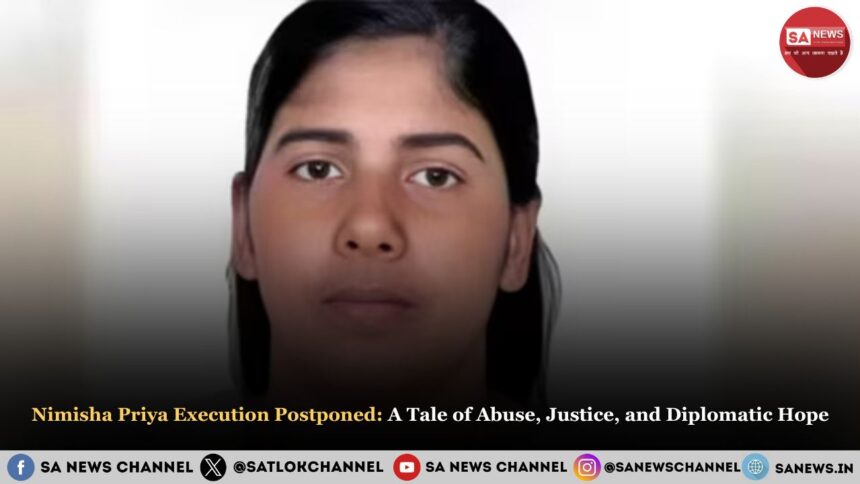Kerala nurse Nimisha Priya’s execution in Yemen has been postponed following India’s diplomatic intervention. Uncover the emotional, legal, and spiritual dimensions of her case, where law, abuse, and mercy collide in a heartbreaking plea for justice and forgiveness
- Who is Nimisha Priya?
- What Led to the Crime?
- Trial and Death Sentence
- India’s Role and Government Intervention
- Minister of External Affairs spokesperson Randhir Jaiswal stated:
- Blood Money & Negotiation Attempts
- Media & Public Reaction
- What Lies Ahead for Nimisha Priya
- Spiritual Reflection: What Does True Justice Mean?
- FAQs about Nimisha Priya case
Who is Nimisha Priya?
Nimisha Priya is a trained nurse from Kerala who moved to Yemen in 2008 in search of better job opportunities. Like many Indian expatriates, her only dream was to uplift her family’s life through honest work. She opened a clinic in Sana’a and quickly became a trusted healthcare provider. However, her life took a devastating turn in 2017 when she was arrested for the murder of her Yemeni business partner, Talal Abdo Mahdi.
What Led to the Crime?
Nimisha’s relationship with Mahdi reportedly became abusive and controlling. He allegedly forged her signature to marry her under Yemeni law and confiscated her passport, effectively trapping her in a foreign land. In an attempt to retrieve her documents, she sedated Mahdi with an injection. Tragically, he died from an overdose. In a state of panic, she attempted to dispose of the body, an act that severely complicated her legal position.
Trial and Death Sentence
In 2018, a Yemeni court sentenced her to death for murder. Appeals followed, but in 2023, Yemen’s Supreme Court upheld the capital punishment. The Yemeni President later signed her execution order, setting July 16, 2025, as the official date. The case sparked outrage across India and human rights circles, highlighting the risks Indian workers, especially women, face abroad in isolated and vulnerable roles.
India’s Role and Government Intervention
India does not have an embassy in Houthi-controlled Yemen, making the case even more complicated. However, the Indian government, through its mission in Djibouti and support from friendly nations like Oman and Iran, made repeated efforts to intervene.
Minister of External Affairs spokesperson Randhir Jaiswal stated:
“We have been extending all possible consular and legal assistance. We are in touch with local authorities and other stakeholders.”
The Kerala Government and the Save Nimisha Priya Action Council mobilized public support and raised funds to pursue a legal and humanitarian resolution, including through the concept of “blood money”, a compensation permitted under Yemeni Sharia law that may lead to a pardon from the victim’s family.
Blood Money & Negotiation Attempts
Under Yemen’s Islamic legal system, the victim’s family has the right to pardon the accused in exchange for “Diya” (blood money). Nimisha’s supporters reportedly raised over ₹1 crore (approx. $125,000), but Talal Mahdi’s family rejected the offer, citing issues of honor and dignity.
Also Read: Why Is This Indian Nurse on Death Row in Yemen? The Story of Nimisha Priya
In a last-minute development, Talal’s family agreed to delay the execution to allow further dialogue. However, this delay is not a pardon, it is merely a narrow window of opportunity to negotiate mercy.
Media & Public Reaction
The case has attracted global attention. Human rights organizations, Indian citizens, and the diaspora have called for urgent government intervention. Hashtags like #SaveNimishaPriya and #JusticeForNimisha have trended across platforms.
Public opinion remains divided. Some advocate for forgiveness, citing her abusive circumstances and desperation. Others argue that the method and aftermath of the crime were too extreme to be overlooked.
What Lies Ahead for Nimisha Priya
Nimisha Priya’s execution has been postponed, creating a critical window for negotiation and legal reconsideration. With India’s continued diplomatic outreach and funds raised as blood money, the final decision now rests with the victim’s family under Yemen’s Sharia law.
While her case underscores the risks faced by Indian expatriates, particularly women, it also reflects the Indian government’s ongoing commitment to safeguarding its citizens abroad. As negotiations continue, hope remains alive that justice tempered with mercy might still prevail.
Spiritual Reflection: What Does True Justice Mean?
In a world where justice often seems incomplete or delayed, the case of Nimisha Priya invites deeper introspection. Saint Rampal Ji Maharaj teaches that true justice is not confined to courtrooms or legal codes, it operates under the universal law of karma. Every soul is bound by its actions, and only devotion to the Supreme God, Kabir Sahib, can erase karmic debt and offer real forgiveness.
Rather than seeking vengeance or being trapped in legal drama, one should adopt spiritual wisdom that guides toward mercy, reform, and liberation. True justice lies in transformation of the soul, not punishment of the body. To learn more about this divine knowledge, visit: www.SupremeGod.org
FAQs about Nimisha Priya case
1. Who is Nimisha Priya?
She is a nurse from Kerala sentenced to death in Yemen for the 2017 murder of her business partner.
2. Why was she sentenced to death?
Nimisha attempted to sedate her partner to retrieve her passport. He died from an overdose, and she tried to dispose of the body.
3. Has her execution been cancelled?
No, it has only been postponed. Negotiations with the victim’s family are ongoing.
4. What is India’s role in the case?
India is providing legal and diplomatic assistance through its Djibouti mission and regional allies.
5. What is blood money in this context?
Blood money, or Diya, is compensation offered to the victim’s family for a pardon under Islamic law.
6. Why has this case received so much attention in India?
Because it reveals the vulnerability of Indian women abroad, challenges diplomatic strength, and stirs deeper debates around justice, abuse, and mercy.









